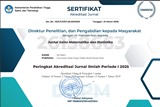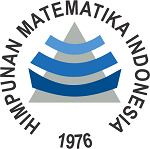Estimation of Online learning Challenges in Rural Areas During a Pandemic with Linear Regression
Abstract
Full Text:
PDFReferences
S. Dhawan, Online learning: A panacea in the time of COVID-19 crisis. Journal of Educational Technology Systems, 2020; 49(1): 5-22. https://doi.org/10.1177/0047239520934018
O. B. Adedoyin, E. Soykan, COVID-19 pandemic and online learning: the challenges and opportunities. Interactive Learning Environments. 2020. Advance online publication. https://doi.org/10.1080/10494820.2020.1813180
D. Nambiar, The impact of online learning during COVID-19: students' and teachers' perspectives. The International Journal of Indian Psychology. 2020; 8(2): 783-793. https://doi.org/10.25215/0802.094
S. L. Schneider, M.L. Council, Distance learning in the era of COVID-19. Archives of dermatological research. 2020. Advance online publication. https://doi.org/10.1007/s00403-020-02088-9
K. H. Arghob, Analisis Faktor Penyebab Kesulitan Belajar Ipa Siswa Smp Kota Semarang. Edu Sains: Jurnal Pendidikan Sains & Matematika. 2018; 6(1): 33 – 42
Ismail. Diagnosis Kesulitan Belajar Siswa Dalam Pembelajaran Aktif Di Sekolah. Jurnal Edukasi: Jurnal Bimbingan Konseling. 2016; 2(1): 31 – 41
T. Lestari, Z. A. I. Supardi, B. Jatmiko, Virtual Classroom Critical Thinking as an Alternative Teaching Model to Improve Students’ Critical Thinking Skills in Pandemic Coronavirus Disease Era. European Journal of Educational Research. 2021;10(4):2003–15. Available from: https://doi.org/10.12973/eu-jer.10.4.2003
S. Muhammad, N. Muhammad, W. H. Syeh. The Users’ Experiences in Processing Visual Media for Creative and Online Learning Using Instagram. European Journal of Educational Research. 2021; 10(4): 1669-1682
M. Z. Farah, N. Darmawan, N. S. Siti, R. Liszulfah, Analyzing Indonesian Students’ Google Classroom Acceptance During COVID-19 Outbreak: Applying an Extended Unified Theory of Acceptance and Use of Technology Model. European Journal of Educational Research. 2021; 10(4): 1697 – 1710.
Nidawati. Belajar Dalam Perspektif Psikologi Dan Agama. Jurnal Pionir. 2013; 1(1): 14–28
J. Supranto. Statistik, Teori dan Aplikasinya, Erlangga. Jakarta. 2008.
A. Saifuddin. Realibilitas dan Validitas, Pustaka Pelajar. Yogyakarta. 2001
A. W. Neil, Introductory Statistics 9th edition, Addison-Wesley, Pearson. 2012
B. S. McClave, Statistics for Business and Economics 8th edition, Pearson Education Inc. 2011.
DOI: http://dx.doi.org/10.24014/jsms.v8i1.15123
Refbacks
- There are currently no refbacks.
Jurnal JSMS
p-ISSN : 2460-4542 (print)
e-ISSN : 2615-8663 (online)
Alamat : Program Studi Matematika
Fakultas Sains dan Teknologi, UIN Suska Riau
Jl. H.R Soebrantas, No. 155, Tampan, Pekanbaru.
Website : http://ejournal.uin-suska.ac.id/index.php/JSMS
e-mail : jsmsfst@uin-suska.ac.id

This work is licensed under a Creative Commons Attribution-NonCommercial-NoDerivatives 4.0 International License.

















